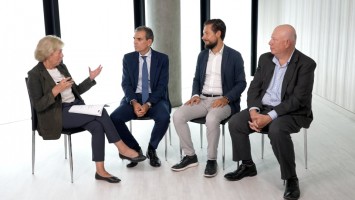Novel multi-antigen targeted CAR-NK cell for the treatment of B cell malignancies
Dr Bahram Valamehr - Fate Therapeutics Inc., San Diego, USA
I gave a talk on some of the new discoveries we’ve been working on related to converting adoptive cell therapy into pharmaceutical drug product development strategies. So, as you’re aware, many drugs are available off the shelf – if you need aspirin you basically take it, you take it every four hours until your headache goes away. Currently adoptive cell therapy that’s not the case, it’s very patient specific, but it is changing the world. CAR T therapy has changed the way we think about cancer treatment. So what we wanted to do is we wanted to create a process that would basically mimic the pharmaceutical drug development process. What we started with was an embryonic stem cell, induced pluripotent stem cell, that is maintained in a petri dish. So these IPSCs, short for induced pluripotent stem cells, are basically cells maintained in a petri dish. They’re happy if you keep them happy and then when you want you can always direct them to become any cell type in the body, all 200 cell types these cells have the potential to become.
So we started with that platform and said what if we engineered those cells and then put all the unique attributes we want and then pick a single cell that has all the components and make that into a master cell bank. Now we have this consistent starting material and then we can initiate manufacturing and then make the cell type of choice. Here it would be NK cells, natural killer cells, and we also make T-cells as well. So now we can make large quantities of engineered NK cells. We chose CAR, chimeric antigen receptor, because it’s so effective in its ability to target and kill the antigen presenting cells. So basically we put all these things into one cell, made a master cell bank and then created the product.
The product has amazing efficacy because natural killer cells are multi-faceted cells, they’re frontline cells, they’re just soldiers of the body. Any time a cell gets infected or a cell gets transformed these cells are at the heart of the fight. They come in, they get rid of those cells. They have the unique ability to sense healthy and transformed cells.
So we took that platform, the natural killer cells, and then with these unique attributes made them better. So they’re more persistent because they have the IL-15 receptor fusion; they’re more targeted because they have the CAR, as I mentioned, and with the CD16 that we put in we can also combine a monoclonal antibody. So now you target antigen CD19 but if the cancer has a unique ability to evolve and elicit antigen escape, so no longer expresses that antigen, you come in with a monoclonal antibody such as Rituxan, it’s an anti-CD20 that’s also expressed on B-cell malignancies, and have a second fresh new round of targeting ability. So this product is now very smart and also it’s available off the shelf. So now any time that a physician needs it they can always just take it off the shelf and overcome this logistical nightmare of procurement, processing, return to the patient and also have a consistent product. We know how it works, the failures, what happened in manufacturing and this way we have now almost an aspirin for cancer.
What are the next steps?
It was cleared for investigational trial by the FDA back in August and we’ve manufactured the product already. So we have hundreds of doses ready to go and we’ll start the clinical trial as early as January. We’ve been saying early next year so hopefully January, February we’ll be in patients. This product will be the third in our pipeline of products that we’ve been treating patients with with this concept. The previous products are natural killer cells but not as engineered, so we took a step fashion. But so far these patients that are on previous clinical trials have been getting multi-dosed application of our product and the product appears to be safe and well tolerated and we are starting to see some efficacy with the previous trials. So we’re very excited about going in with this now more intelligent product.
Are there any other advantages to using this agent over CAR T-cell therapy?
We are making T-cells as well. We have a CAR T-cell programme as well for off the shelf. We’re not trying to compete with CAR T. CAR T, as I mentioned, has revolutionised the way we think about cancer treatment and is a potent, powerful product. So what we’re doing is we’re trying to create a product that can complement CAR T because eventually we have to reconstitute the immune system. If you want to keep up with cancer it’s always evolving and always changing. So eventually we will bring our CAR NK product with our CAR T product and combine it but for now the value that NK cells bring to the table is that they are not simply focussed on one antigen. CAR Ts do a great job, target that one antigen that has been directed through the chimeric antigen receptor, but on the flipside the NK cells, as I mentioned, are multifaceted, they have other activating inhibitory receptors. So they are not just going to go after the antigen that’s directed by the CAR, they have multiple other ways. So this becomes really a unique way to look at cancer treatment because as the cancer evolves the product is smart enough to evolve with it.








